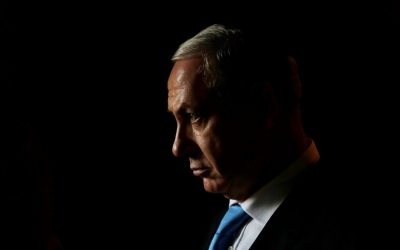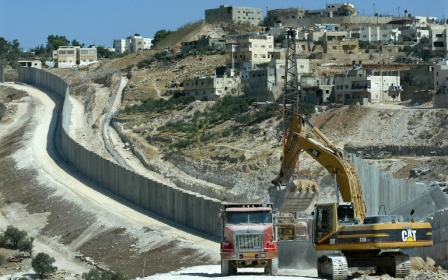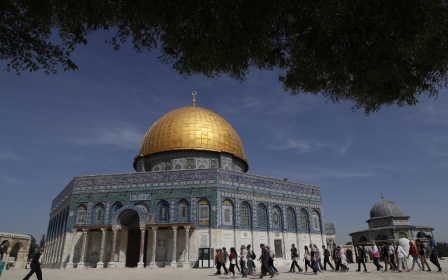A single democratic state offers the best path forward for Palestinians and Israelis

There will be no two-state solution for Israel and the Palestinians. Repeated warnings, over decades, about its imminent demise have forestalled a more profound reckoning that must take place.
Over the past half-century, Israeli authorities have de facto annexed the West Bank, in addition to the de jure (and internationally unrecognised) annexation of East Jerusalem.
Facts on the ground are important, but the failure to establish a sovereign, viable Palestinian state in the occupied Palestinian territories is not primarily about the number of Israeli settlements.
Politics, not practicalities
The end of the two-state framework is not due to a "point of no return" in the settler population or the actions of "extremists on both sides," but because of an Israeli rejection of Palestinian sovereignty and self-determination. The issue, in other words, is politics, not practicalities.
New MEE newsletter: Jerusalem Dispatch
Sign up to get the latest insights and analysis on Israel-Palestine, alongside Turkey Unpacked and other MEE newsletters
Attempts to negotiate a settlement between Israel and the Palestine Liberation Organization (PLO) have always come up short, for a simple reason: the Israeli maximum on offer does not come close to the minimum Palestinians can accept.
Palestinians are geographically dispersed, stateless, fragmented by Israeli restrictions, and beset by critical internal political divisions and crises
The gap may vary, but it has remained unbridgeable. Before his assassination, former prime minister Yitzhak Rabin declared that under a "permanent solution" the Palestinians would have "an entity which is less than a state".
Today, Prime Minister Benjamin Netanyahu is offering Palestinians (at best) "a state minus".
Benny Gantz went into the elections vaguely proposing "separation," but no Palestinian statehood.
So, what comes next? One possibility – a certainty in the short-term – is a continuation of the status quo; a de facto, single apartheid state, with degrees of Palestinian "self-rule".
Another possibility is Israel's formal annexation of parts or all of the occupied West Bank. Many on Israel’s far-right are openly looking to consolidate a formalised, single (apartheid) state between the Jordan River and the Mediterranean Sea, and they sense an opportunity to advance this goal.
Preserving inequalities
There are different scenarios encompassing variations of annexation; some, for example, advocate the formal annexation of Area C – some 60 percent – of the West Bank, with Areas A and B to be run by a Palestinian self-governing entity (in other words, similar to what exists today).
The Trump administration's 'peace plan' is unlikely to offer anything substantially different from the status quo
The Trump administration’s "peace plan," reportedly now set for publication after Ramadan in June, is unlikely to offer anything substantially different from the status quo – ie Palestinian "autonomy" in the context of overall Israeli control.
The plan may even allow for formal Israeli annexation of portions of the occupied West Bank. One thing is clear: White House officials – in both unattributed remarks and on the record comments – have rejected the "two-state solution" framework.
Going forward, it is important to recognise that other, seemingly more "progressive," alternatives to the two-state solution can also serve to preserve existing inequalities.
The Federation Movement, for example, proposes the formal Israeli annexation of the West Bank, followed by the establishment of a federal regional government and the division of the single state into 30 cantons, about 20 of which would have a Jewish majority.
The movement's co-chairs, former prime ministerial official Emanuel Shahaf and former Jewish Agency official Aryeh Hess, may promote their plan in terms of localised autonomy and socioeconomic equality, but the details are shaped by a familiar-sounding "demographic battle".
"In order to change the method of government," Shahaf told Israeli newspaper Haaretz, "it's necessary to have a double majority. Not only a demographic majority but also a majority of the cantons." The need for a Jewish majority means the plan simply excludes the Gaza Strip entirely.
Shahaf and Hess suggest that their federation/cantons plan has advantages for Palestinians. However, not only do they acknowledge "that the proposal falls short of offering a real equitable solution to the Palestinians," but they are hopeful that Palestinians may accept it only on the basis that "they are so weakened that they will accept anything reasonable".
Long-standing asymmetry
Indeed, weakened they are. Palestinians are geographically dispersed, stateless, fragmented by Israeli restrictions, and beset by critical internal political divisions and crises.
These weaknesses, which compound a long-standing asymmetry vis-a-vis Israel, make it all the more incumbent on external actors – particularly those with the potential for leverage – to ensure that what comes after the two-state paradigm does not simply reproduce the kind of structural privileges and discrimination that have characterised Israeli ethnocracy to date.
A study published last year by Rice University's Baker Institute for Public Policy and the Carnegie Endowment for International Peace, titled "Two States or One? Reappraising the Israeli-Palestinian Impasse," claimed that "any solution must adequately address the needs of both sides".
In that context, the report's authors criticised a single democratic state based on a "one-person, one-vote model," on the grounds that "most Israelis likely would not accept such a call for equality, seeing in it an equivalent to the demise of their current state".
The problem here is that the objection of a majority of Jewish Israelis to a "call for equality" is treated as a veto, but whether or not this objection is legitimate goes unscrutinised.
Chance for a reboot
The case of apartheid South Africa is relevant here. The opposition of the white population to equality was relevant, of course, with respect to plotting a course and choosing appropriate strategies for moving forward. But the "need" of white South Africans to retain their structural privilege was not treated as a veto on transitioning to a post-apartheid era.
Israeli rejectionism cannot be allowed to determine the parameters of a political settlement, or continue cost-free
Conflating Israeli demands with rights, and allowing those demands to define the parameters of the possible, has been a characteristic of peace-making efforts for some time – from Israel's refusal to countenance a return of Palestinian refugees, through to the emergence of so-called settlement blocs in the West Bank that "everyone knows" will be part of Israel forever.
There is now an opportunity – an imperative – to place truly democratic values at the heart of a post-two-state era arrangement, in a way that no longer subordinates principles like equality to Israeli demands for an ethno-state and Jewish majority.
This will not be easy – but one of the key ingredients is an approach rarely considered, let alone advocated for, by Western analysts and policy makers: substantial economic and diplomatic pressure on Israel.
It is time to grasp the nettle: Israeli rejectionism cannot be allowed to determine the parameters of a political settlement, or continue cost-free.
The views expressed in this article belong to the author and do not necessarily reflect the editorial policy of Middle East Eye.
Middle East Eye delivers independent and unrivalled coverage and analysis of the Middle East, North Africa and beyond. To learn more about republishing this content and the associated fees, please fill out this form. More about MEE can be found here.







